ANALISIS KEMAMPUAN PEMECAHAN MASALAH MATEMATIKA DITINJAU DARI SELF-EFFICACY SISWA PADA MATERI SISTEM PERSAMAAN LINEAR TIGA VARIABEL
DOI:
https://doi.org/10.22460/jpmi.v4i4.p%25pKeywords:
Self-efficacy, Problem solving, System of linear equations in three variablesAbstract
References
Amalia, A., Syafitri, L. F., Sari, V. T. A., & Rohaeti, E. E. (2018). Hubungan antara kemampuan pemecahan masalah matematik dengan self efficacy dan kemandirian belajar siswa smp. JPMI: Jurnal Pendidikan Matematika Inovatif, 1(5), 887–894.
Ardiyanti, Bharata, H., & Yunarti, T. (2014). Analisis kesalahan siswa dalam menyelesaikan soal cerita matematika. Jurnal Pendidikan Matematika Universitas Lampung, 2(7).
Azis, D. M., & Lukman, Hamidah Suryani’Agustiani, N. (2018). Analisis kesalahan siswa dalam menyelesaikan soal matematika pada materi sistem persamaan linear tiga variabel kelas x sman 1 cisaat. Jurnal Tadris Matematika, 1(2), 193–206.
Azzahra, R. H., & Tirtayasa, H. (2020). Analisis kemampuan pemecahan masalah siswa pada materi sistem persamaan linear tiga variabel. Transformasi: Jurnal Pendidikan Matematika Dan Matematika, 4(1), 153–162.
Bandura, A. (1997). Self-efficacy: the exercise of control. Worth Publishers.
Creswell, J. W., & Clark, V. L. P. (2007). Designing and conducting mixed methods research. Sage Publication, Inc.
Hamimi, L., & Lasmita. (2019). Diagnosis kesalahan siswa dalam menyelesaikan sistem persamaan linear tiga variabel. In Prosiding Seminar Nasional Multidisiplin Ilmu (pp. 164–172).
Ignacio, N. G., Nieto, L. J. B., & Barona, E. G. (2006). The affective domain in mathematics learning. International Electronic Journal of Mathematics Education, 1(1), 16–32.
Jatisunda, M. G. (2017). Hubungan self-efficacy siswa smp dengan kemampuan pemecahan masalah matematis. Jurnal Theorems (The Original Research of Mathematics), 1(2), 24–30.
Kuswanti, Y., Sudirman, & Nusantara, T. (2018). Deskripsi kesalahan siswa pada penyelesaian masalah sistem persamaan linear tiga variabel (spltv). Jurnal Pendidikan, 3(7), 865–872.
Maddux, J. E., & Gosseline, J. T. (2012). Self-efficacy. In M. R. Leary & J. P. Tangney (Eds.), Handbook of self and identity (pp. 198–224). The Guliford Press.
Mahardhikawati, E., Mardiyana, & Setiawan, R. (2017). Analisis kemampuan pemecahan masalah berdasarkan langkah-langkah polya pada materi turunan fungsi ditinjau dari kecerdasan logis-matematika siswa kelas xi ipa sma negeri 7 surakarta tahun ajaran 2013/2014. Jurnal Pendidikan Matematika Dan Matematika SOLUSI, 1(4), 119–128.
NCTM. (2002). Principles and standards for school mathematics. Reston V.A: NCTM.
Nelson-Jones, R. (2011). Teori dan praktik konseling dan terapi. Yogyakarta: Pustaka Pelajar.
Nicolaidou, M., & Philippou, G. (2003). Attitudes towards mathematics, self-efficacy and achievement in problem-solving. European Research in Mathematics Education III, 1(11).
Pajares, F. (1996). Self-efficacy beliefs and Mmathematical problem-solving of gifted students. Contemporary Educational Pshychology, 21, 325–344.
Pajares, F., & Miller, M. D. (1994). Role of Self-Efficacy and Self-Concept Beliefs in Mathematical Problem Solving : A Path Analysis, 86(2), 193–203.
Patra, G. P. A. P., & Pujiastuti, H. (2020). Analisis kesalahan siswa dalam menyelesaikan soal cerita sistem persamaan linear tiga variabel. MAJU, 7(2), 174–181.
Peranginangin, S. A., & Surya, E. (2017). An analysis of students’ mathematics problem solving ability in vii grade at smp negeri 4 pancarbatu. International Journal of Sciences: Basic and Applied Research, 33(2), 57–67.
Polya, G. (1985). How to solve it: a new aspect of mathematical methods. New Jersey: Pearson Education, Inc.
Somawati. (2018). Peran efikasi diri (self-efficacy) terhadap kemampuan pemecahan masalah matematika. Jurnal Konseling Dan Pendidikan, 6(1), 39–45.
Tambychik, T., & Meerah, T. S. M. (2010). Students’ difficulties in mathematics problem-solving: what do they say? In Procidia Social and Behavioral Sciences 8 (pp. 142–151).
Ulya, R., & Hidayah, I. (2016). Kemampuan pemecahan masalah ditinjau dari self-efficacy siswa dalam model pembelajaran missouri mathematics project. Unnes Journal of Mathematics Education Research, 5(2), 178–183.
Utami, R. W., & Wutsqa, D. U. (2017). Analisis kemampuan pemecahan masalah matematika dan self-efficacy siswa smp negeri di kabupaten ciamis. Jurnal Riset Pendidikan Matematika, 4(2), 166–175.
Yuliyani, R., Handayani, S. D., & Somawati. (2017). Peran efikasi diri (self efficacy) dan kemampuan berpikir positif terhadap kemampuan pemecahan masalah matematika. Formatif: Jurnal IImiah Pendidikan MIPA, 7(2), 130–143.
Zimmerman, B. J. (2000). Self-efficacy: an essential motive to learn. Contemporary Educational Psychology, 25, 82–91.
Zimmerman, B. J., & Kitsantas, A. (2005). Homework practices and academic achievement: the meditating role of self-efficacy and perceived responsibility beliefs. Contemporary Educational Psychology, 30, 397–417.

















